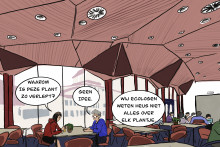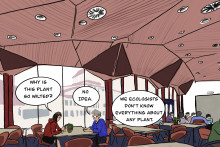The plenary was a meeting of the Intergovernmental Science-Policy Platform on Biodiversity and Ecosystem Services (IPBES), which serves under the flag of UN. The objective of the international event was to present and review a three-year assessment report on the global state of biodiversity and land degradation, which was put together by hundreds of researchers from all over the world. One of its chapters was in the hands of UT researcher Wieteke Willemen and ITC alumna Grace Nangendo.
‘IPBES was founded in 2012 with the goal to provide participating countries with scientific evidence on the state of biodiversity and land degradation on our planet,’ Willemen begins the story leading to the March conference in Medellín. ‘The countries required this evidence in order to improve their policies and general well-being. We finally presented the results of this task last week.’ By ‘we’, Willemen means more than 100 leading experts from 45 countries.

Nominated by the government
How did an ITC researcher become involved? ‘IPBES submitted a call for experts, I applied and the Dutch government nominated me,’ clarifies Willemen, who was selected by the UN as one of the lead authors of the report’s chapter on ‘decision support’. She confesses that working on the global assessment was demanding and time-consuming, but ‘definitely worth it’: ‘It was too important not to do. After all, in the end 129 countries will use what you wrote.’
What Willemen wrote – together with a team of authors – was an assessment of the type of information and tools that policy makers could use to make the best possible decisions in terms of nature and biodiversity. ‘This assessment included, for instance, an evaluation of tools, such as mapping software, but also personal statements from people living at certain places who have first-hand experience with land degradation at the location,’ explains the scientist and adds: ‘Every year we had to prepare a new draft based on hundreds of comments from all involved governments.’
30 hours of negotiations
If preparing the chapter wasn’t easy, presenting it and getting it approved was certainly challenging. ‘To get the final text approved by all the countries, I had to take part in 30 hours of negotiations – spread over only three days,’ says Willemen. ‘It was like a PhD defense but much longer and for a much tougher audience. All the countries had to give their consent and there were many discussions about the terminology and policy guidelines included in the text.’

Photo by IISD/ENB | Diego Noguera (Wieteke Willemen on the bottom right)
Land degradation is now critical
The negotiations were successful in the end and the entire IPBES report was approved. What was its main conclusion? ‘That land degradation worldwide is now at a critical point,’ answers Willemen. ‘It shows that our prosperity and wellbeing are seriously threatened by the degradation of nature. When we talk of land degradation, we talk of land losing its ability to support everything we require of it. And that is happening almost everywhere in the world, including the Netherlands. Although we don’t feel the urgency here, because most of our commodities come from other countries.’
According to the ITC researcher, the recently released IPBES assessment proves that we need to take action. ‘The document includes options on what should be done and how, but it is now up to the governments to decide. Something should be done, though, because nature is losing its functionality everywhere. Nature needs us and we need nature. And if we keep degrading it, we will feel it really hard.’









